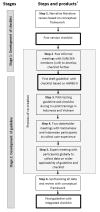A Guideline for Contextual Adaptation of Community-Based Health Interventions
- PMID: 35627327
- PMCID: PMC9141251
- DOI: 10.3390/ijerph19105790
A Guideline for Contextual Adaptation of Community-Based Health Interventions
Abstract
In Southeast Asia, community-based health interventions (CBHIs) are often used to target non-communicable diseases (NCDs). CBHIs that are tailored to sociocultural aspects of health and well-being: local language, religion, customs, traditions, individual preferences, needs, values, and interests, may promote health more effectively than when no attention is paid to these aspects. In this study, we aimed to develop a guideline for the contextual adaption of CBHIs. We developed the guideline in two stages: first, a checklist for contextual and cultural adaptation; and second, a guideline for adaptation. We performed participatory action research, and used the 'Appraisal of Guidelines for Research & Evaluation (AGREE) II' tool as methodological basis to develop the guideline. We conducted a narrative literature review, using a conceptual framework based on the six dimensions of 'Positive Health' and its determining contexts to theoretically underpin a checklist. we pilot tested a draft version of the guideline and included a total of 29 stakeholders in five informal meetings, two stakeholder meetings, and an expert review meeting. This yielded a guideline, addressing three phases: the preparation phase, the assessment phase, and the adoption phase, with integrated checklists comprising 34 cultural and contextual aspects for the adaption of CBHIs based on general health directives or health models. The guideline provides insight into how CBHIs can be tailored to the health perspectives of community members, and into the context in which the intervention is implemented. This tool can help to effect behavioral change, and improve the prevention and management of NCDs.
Keywords: Positive Health; adaptation; co-creation; community-based health interventions; cultural context; guideline; participatory action research.
Conflict of interest statement
The authors declare no potential conflicts of interest.
Figures
References
-
- Pardoel Z.E., Reijneveld S.A., Lensink R., Widyaningsih V., Probandari A., Stein C., Hoang G.N., Koot J.A.R., Fenenga C.J., Postma M., et al. Core health-components, contextual factors and program elements of community-based interventions in Southeast Asia—A realist synthesis regarding hypertension and diabetes. BMC Public Health. 2021;21:1917. doi: 10.1186/s12889-021-11244-3. - DOI - PMC - PubMed
Publication types
MeSH terms
LinkOut - more resources
Full Text Sources



